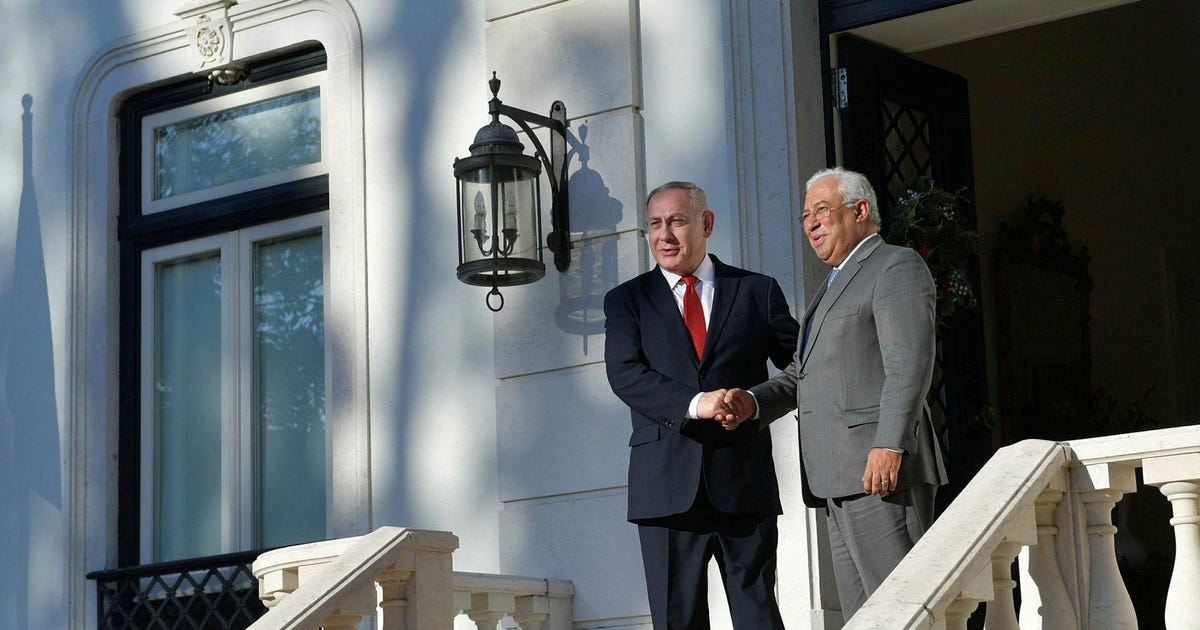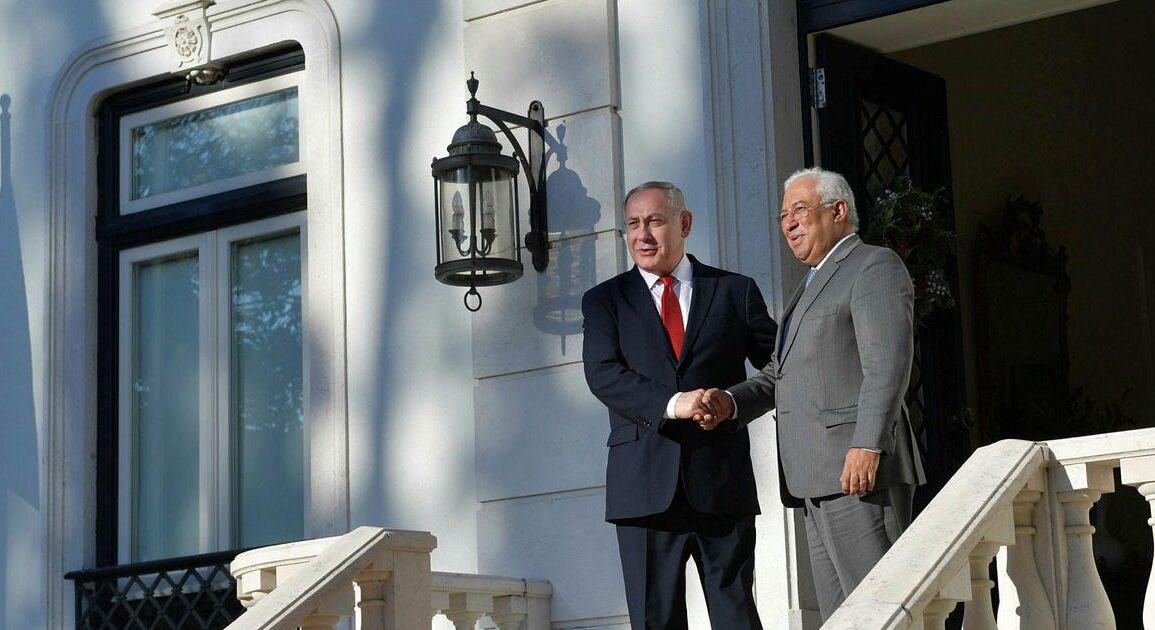
Toward the end of my term as ambassador, in August 2021, Portuguese Foreign Minister Augusto Santos Silva (today the president of his country’s parliament) invited me for a farewell meeting. At it, he remarked with satisfaction on the growing closeness between Jerusalem and Lisbon and the improvement in their bilateral dialogue.
Santos Silva, a fascinating academic and statesman, was also aware of the complexities of the Middle Eastern conflict. During his visits to Israel, he met with Benjamin Netanyahu, Yair Lapid and Benny Gantz, as well as a man he greatly admired, the late author Amos Oz.
At the end of this farewell meeting, as he escorted me out of his office, he shook my hand warmly and said, “Even though we may have disagreements, you have a friend here who always remembers that Israel is a strong democracy.”
And indeed, Israel has had and will have many disagreements with its interlocutors overseas, and certainly as long as the Israeli-Palestinian conflict remains unresolved. Nevertheless, it can also find friendship and an attentive ear for its arguments, as long as it is seen as a democracy.
During my roughly 40 years of diplomatic service, I was always proud of Israel’s democracy, which, even if it isn’t perfect (like many other democracies), is the only one in the Middle East. It’s a country born in battle and forced to defend itself against existential threats ever since it was established, yet the fact that it was a liberal democracy was axiomatic both to the man who envisioned it and those who founded it.
But in recent days, I’ve been flooded with questions like “what happened to you?” or “what happened to him?” from friends in Portugal and other countries in which I served as the state’s representative.
In December 2019, Prime Minister Benjamin Netanyahu visited Lisbon to meet with Mike Pompeo, then the U.S. secretary of state. Netanyahu also met with his Portuguese counterpart, Antonio Costa. This was two weeks after the televised speech in which Netanyahu urged that someone “investigate the investigators,” one of the first of his many assaults on the justice and law enforcement systems.
Toward the end of the meeting, at which various issues were discussed, Netanyahu turned to Costa and raised the issue of the International Criminal Court in The Hague, of which Portugal is a member. He sought to convince the Portuguese premier to take a clear stance that the court should not get involved in investigating the conduct of Israeli soldiers.
Netanyahu spent quite a bit of time lauding the Israeli justice system, first and foremost its Supreme Court. The system is completely independent and extremely professional, he explained. It isn’t afraid of in-depth investigations and their consequences, even if they entail investigating our soldiers’ conduct in battle.
Israel’s justice system enjoys an international reputation; it’s a source of pride for us, he continued. And he stressed that it functions like that of every other free Western democracy, making intervention by the ICC or other foreign courts unnecessary.
Yes, all that was said by the man who, just a little while earlier, had launched a systematic campaign to castrate the justice system.
Now that the law abolishing the courts’ power to overturn government decisions they deem unreasonable has passed – the “salad course” or “appetizer” for the broader legal overhaul – it’s clear that Netanyahu, a criminal defendant, prioritized his personal interests and abandoned Israeli soldiers. Consequently, is it any wonder that more and more of them feel that their legal flak jacket has been taken away from them because of Netanyahu’s phobia of disinfectants?
The Knesset’s first assassination attempt on our founding document, the Declaration of independence, occurred as far back as June 2018, with the passage of the nation-state law, whose sponsors declined to include even a single sentence guaranteeing equal rights for all Israelis in the spirit of the declaration. With my own eyes, on a daily basis, I saw how my deputy, a gifted young diplomat from the Druze community, was offended, pained and troubled.
At a Memorial Day ceremony for a mixed audience of Israelis and Portuguese, I chose to show a video about Lt. Col. Mahmoud Kheir el-Din, who fell during a secret operation in the Gaza Strip and whose name was still under a gag order at that time. Even his widow’s face had to be blurred on orders from the military censor.
In my remarks, I also apologized to my offended deputy and hoped for the day when the law would be amended so that it didn’t exclude some Israelis – an elementary change that was also demanded at the time by Likud MK Benny Begin. Regrettably, his outcry was drowned by an ugly wave of warped patriotism that quickly turned into radical nationalism and then morphed into “Jewish supremacy,” a twin of the racist and fascist movements familiar to us from other places.
Once, we believed that we were immune to ideologies based on ethnic or racial classifications, especially given our people’s past experiences. We could certainly never have imagined that a student of Ze’ev Jabotinsky, Menachem Begin, Yitzhak Shamir and Moshe Arens would make racist Kahanists and benighted homophobes senior ministers of the Jewish state.
During each of my years of service in Lisbon, April 25 was an important day on my calendar. On that day, I and the other ambassadors were invited to parliament for a ceremony in honor of the Carnation Revolution, which began on that date in 1974.
The revolution was a popular uprising, virtually devoid of bloodshed, that was actually started by the army to put an end to the dictatorship of Antonio Salazar and his heirs. The men in uniform left their barracks with red carnations in their rifles and invited the civilians to join them. That is how the democracy that Portugal enjoys to this day was born.
The peak moment was always when the elderly “captains” who began the revolution entered parliament. Members of parliament and the guests would applaud them enthusiastically. It was a fascinating history lesson.
The criminal defendant has made fringe extremists, some of whom he avoided being photographed with during the election campaign, the people steering the ship, despite having promised us and the world that he would be the only one at the helm. On the day the law abolishing the reasonableness standard passed, we saw him give in to his captors; not even his fingertips were touching the wheel.
The historian’s son has ensured himself a dubious place in the history books as the man who tried to assassinate the Zionist enterprise by establishing an authoritarian, theocratic, racist and fascist regime – rule by a secular dictator, a corrupt hedonist, who is reliant on a gang of Jewish ayatollahs. This will apparently be the last homegrown startup.
His name will be attached to a modern-day version of the 1903 Uganda Program – the flight to Portugal (and other countries) of thousands of young Israeli families who can no longer tolerate the cost of living and, even worse, the sunset of liberal democratic Israel. With my own eyes, I have witnessed the rush for foreign passports and the rapid growth of Israeli emigrant communities in Portugal. My heart is breaking.
Above all, this inciter and divider will be remembered as the person who ignited a civil war on the eve of Tisha B’Av 2023.
Nevertheless, we shouldn’t despair. If he refuses to obey the Supreme Court, carnations will spring up here, too. If an elderly cancer patient like me isn’t afraid of water cannons, mounted police and even more violent tactics born of the fantasies of the criminal whom Netanyahu appointed as national security minister, then the brave, determined young men and women I meet at protests certainly won’t be deterred.
We have an opportunity to save the Jewish, democratic and liberal state of Israel, even if the effort exacts a heavy price. Indeed, we are already paying it. But we have no intention of wasting this chance.
Rafi Gamzou is a former deputy director general of the Foreign Ministry and served as ambassador to Portugal from 2017 to 2021.
Click the alert icon to follow topics:
This post was originally published on this site be sure to check out more of their content.









